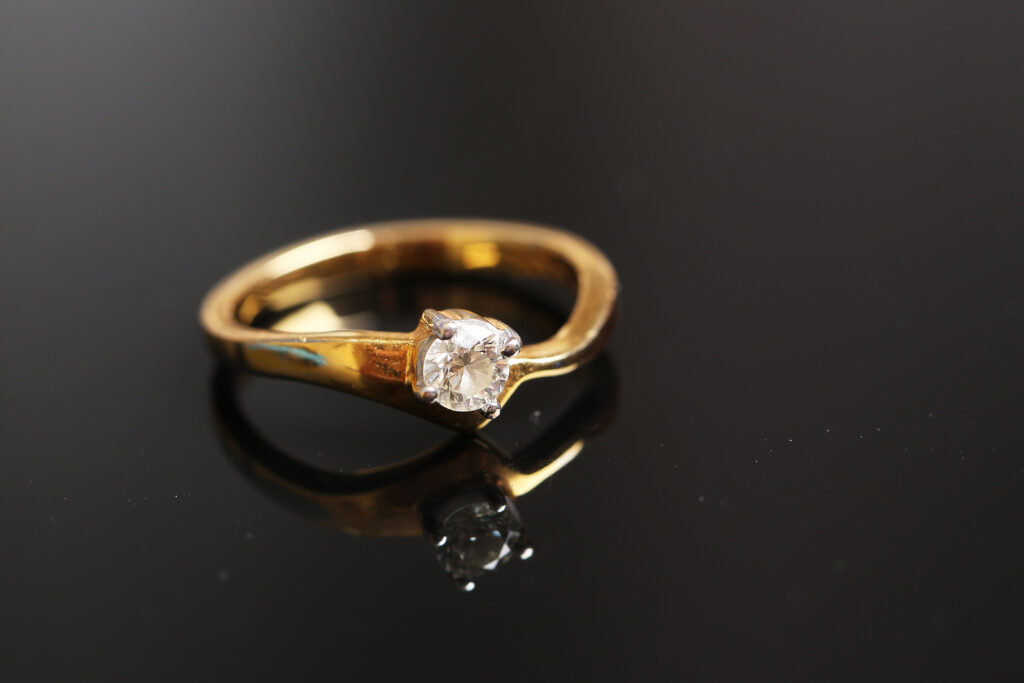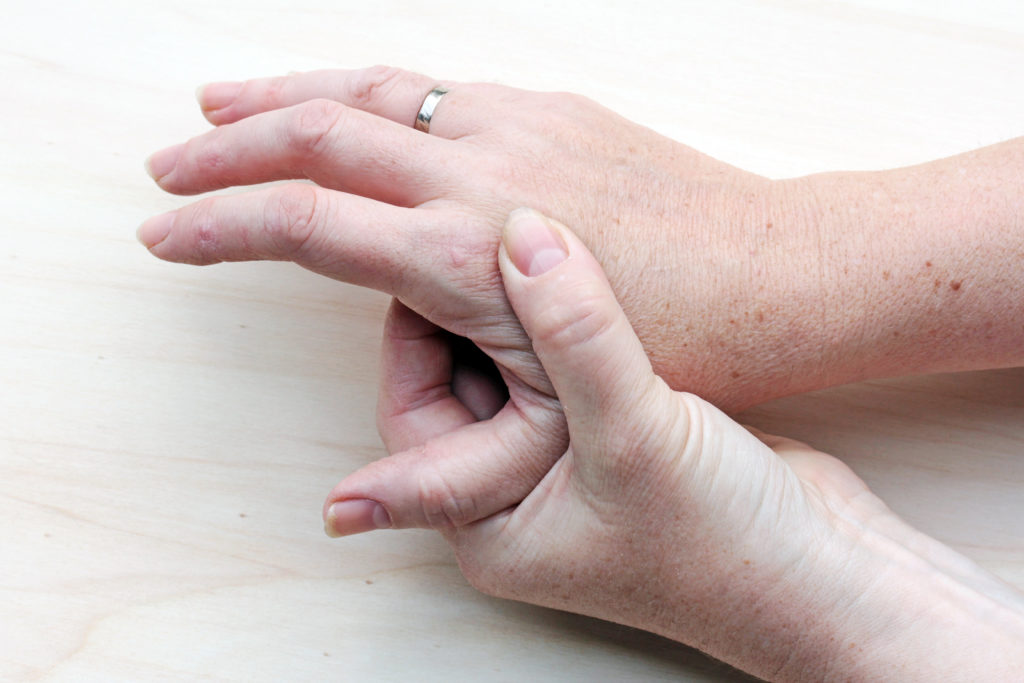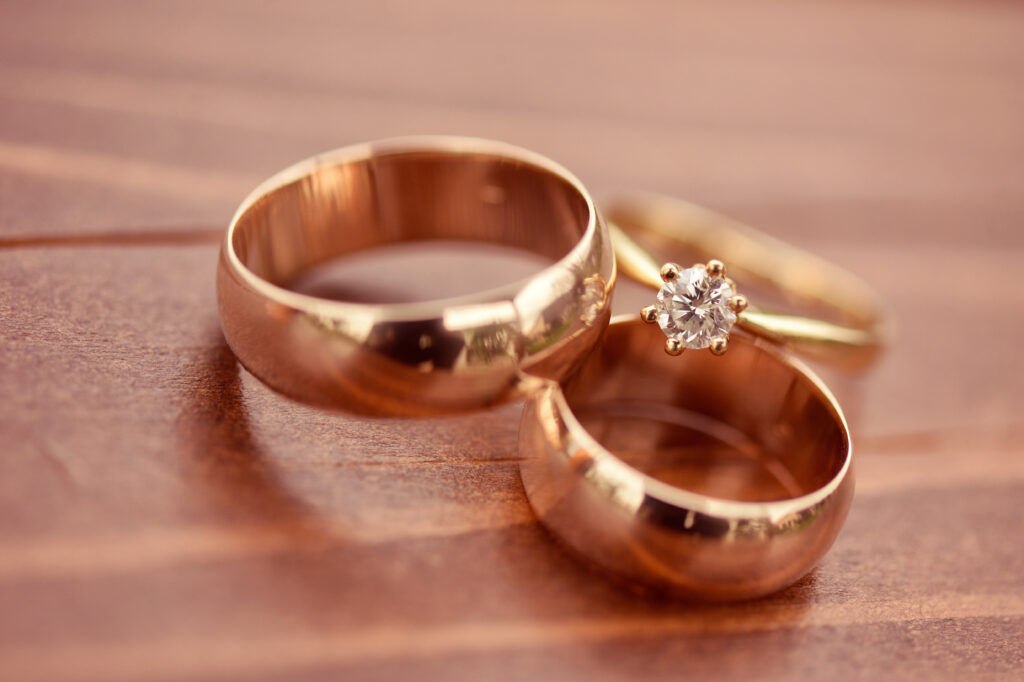Many of us are familiar with cheap metal rings turning our fingers green, but what about gold rings turning our fingers black?
This is more common than you think and even the purest gold rings can discolor your skin if you’re not paying attention.
Due to the purity of the gold, environmental, chemical, and biological factors, gold rings can turn fingers black. By cleaning the ring, removing the ring around corrosive materials, applying absorbent powder, sealing the ring, and adding a rhodium plating, the discoloration can be reduced.
Even though you may be having gold ring issues, there are ways you can save the coloration of your finger.
We’ll cover some of the reasons for black staining below and some ways you can prevent it.
Reasons Gold Rings Cause Discoloration
Ring Purity
Gold is considered a soft metal. In its purest form, it is not as durable as most people need for a daily-use ring.
To increase durability, most jewelers will mix gold with other metals like silver, copper, nickel, and zinc.
Even though these metals strengthen the ring, they are also a factor in discoloring your skin.
That being said, even rings with the highest purity of gold can turn your finger black depending on other factors.
Environmental Factors
In most situations, humid environments can greatly add to the tarnishing of your ring.
The excessive moisture clings to your skin and causes you to sweat more, both of which increase the amount of moisture that can be trapped between the ring and your finger.
As the air’s moisture and your sweat mix together, the metal corrodes and leaves a black residue on your skin.
This is especially true for those who live near an ocean. The saltwater evaporates into the atmosphere and speeds up the process mentioned above.
The more salt and moisture, the more corrosion, the more discoloration on your finger.
Additionally, environments with lots of chlorine and sulfur will increase corrosion as the elements react with the other metals that are in the ring.

Chemical Factors
Various products that we interact with during the day can decrease the integrity of our rings.
Specifically, when we use cleaning chemicals, most have abrasive particles that can cause the gold and other metals in the ring to corrode more rapidly.
As the chemicals corrode, they expose the gold and can generate a film of fine dust that lingers on the skin as black discoloration.
Since there are plenty of ways to avoid direct contact with cleaning chemicals, it may be more likely that the products corroding your gold ring are actually cosmetics.
Most cosmetics, whether makeup or lotion, contain compounds that are stronger than gold.
Thus, the compounds in the cosmetics you use will rub off tiny particles of the ring.
Just like chemical corrosion will leave fine dust, so too will cosmetics.
The dust then lingers as a black marking on your finger.
This process is referred to as metallic abrasion and tends to be the most common reason for discoloration.
Biological Factors
Just like humid environments can cause moisture to form between your finger and ring to cause corrosion, your natural sweat, oils, and acids released when perspiring can react with the ring to cause discoloration.
Since this is an entirely natural bodily process, it is harder to prevent. However, there are ways to solve this problem.
Solutions to Discoloration
Regularly Clean Your Ring
Cleaning your ring frequently will remove any build-up of sweat, dirt, and chemicals that could corrode your ring.
By safely cleaning your ring, you will not only preserve your skin’s coloration but the ring itself.
To safely clean your ring:
- Add a small amount of Dawn dish detergent (very specifically Dawn, other dish detergents and soaps can contain corrosive or abrasive substances that will only tarnish the ring worse) and a few drops of ammonia to warm water.
- Gently brush the ring with this solution using a new, baby-size soft toothbrush.
- Rinse the ring with lukewarm water.
- Air dry or gently towel-dry with a regular cloth.
Remove Your Ring Around Corrosive Substances
Whenever you are using soap or cleaning chemicals, make sure you are not wearing your ring.
This includes taking off your ring when doing the dishes and other various cleaning tasks, taking a shower, washing your hands, going swimming in a pool or ocean (very important to avoid any contact with chlorine), and applying lotion or cosmetics.
After doing any of these activities, wash your hands and allow them to dry completely before putting on your ring again.
For lotion and/or cosmetics, make sure the product has been completely absorbed before putting on your ring.

Apply Absorbent Powder
Absorbent powders are especially useful for individuals who live in humid environments or sweat easily.
Make sure to get an absorbent powder that is very fine and completely free of abrasives.
Apply the powder before putting on your ring to absorb any moisture. You can re-apply throughout the day as needed.
Seal The Ring
You can seal your ring by applying jewelry lacquer or clear nail polish to the inside of the ring.
This creates a protective barrier for the ring from your body’s corrosive properties and a protective layer for your skin from discoloration.
Over time, the seal will need to be reapplied but if you’re using jewelry lacquer or clear nail polish, it won’t damage the ring.
Add A Rhodium Plating
Rhodium platings are much more durable protective barriers between the ring and your skin than the liquid sealings mentioned above.
However, that extra durability is more expensive.
These platings do not scratch, dent, or corrode and will increase the ring’s strength and luster.
This can be applied to the entire ring or just the inside.
After some time, friction will wear off the inside plating, so just like the other sealing methods, you will need to get your ring replated occasionally.
Last Case Scenario
If none of these solutions are working, you may have to switch the kind of metal you wear.
You can try upgrading to a ring with a higher purity of gold or even consider getting platinum rings.
Platinum is very unlikely to discolor your skin, so it’s a safe bet when trying to escape discoloration.


